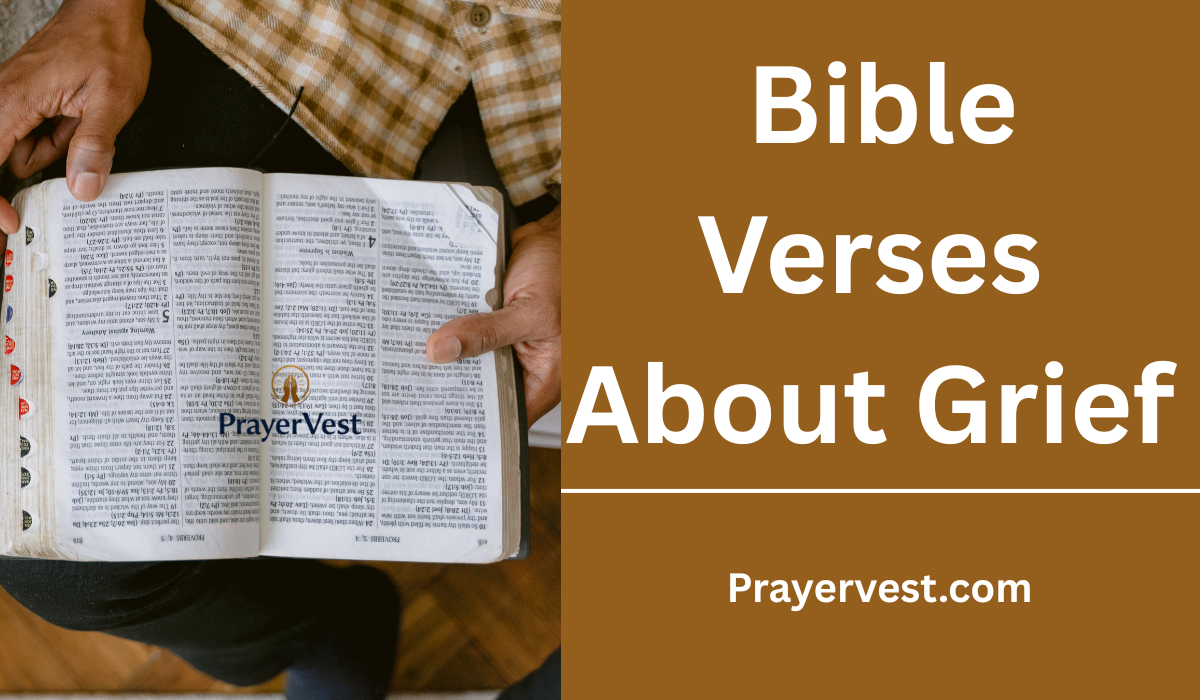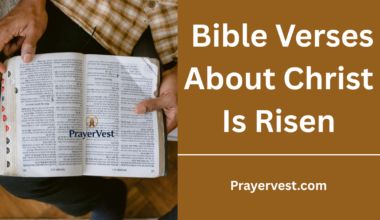Every person experiences grief at some point in their life due to loss, suffering, or sadness. The Bible provides consolation, hope, and strength to individuals who are grieving, rather than avoiding the realities of sadness.
Scripture demonstrates that God can see our tears, feel our anguish, and accompany us throughout times of brokenness. Bible passages regarding grief serve as a reminder that grieving is a holy expression of love and loss, met by God’s healing presence and compassion, not a sign of weakness.
From Jesus’ consoling words to the lamenting Psalms, the Bible offers consolation and direction to the bereaved heart. These verses tell us that God is always around, even in our darkest hours, and that grief and faith can coexist. They reveal a God who consoles the heartbroken, promises eternal hope, and assures that grief will eventually give way to joy.
The Bible also exhorts us to use our sorrow as an opportunity to pray, believing that God will hear our prayers and grant us an unfathomable peace.


We can find strength in the midst of weakness and light in the midst of darkness by studying Bible scriptures about grieving. These verses serve as a reminder that grieving is a process, one that God does not want us to go through alone. The Bible provides comfort and healing whether you are grieving the loss of a loved one, dealing with disappointment, or bearing a heavy burden. We are encouraged to rely on God’s promises, find solace in His presence, and cling to the prospect of healing and eternal life through these verses.
40 Uplifting Bible Verses About Grief (2026)
1. Psalm 34:18
“The Lord is close to the brokenhearted and saves those who are crushed in spirit.”
This verse is one of the most comforting promises in Scripture for those in grief. It reminds us that God is not distant when we are brokenhearted; He draws near. Loss can crush the spirit, leaving us feeling abandoned, but here we see God actively present, offering salvation and renewal in the darkest moments. His nearness is not just emotional but redemptive—He saves us from being consumed by sorrow and restores hope when it feels impossible to carry on.
2. Matthew 5:4
“Blessed are those who mourn, for they will be comforted.”
Jesus speaks directly to mourners, reassuring them that grief is not meaningless. Instead, those who mourn are declared “blessed” because they will receive divine comfort. Unlike worldly consolation, which is temporary, the comfort Christ gives is eternal and restorative. This verse affirms that God acknowledges our pain and promises to meet us in it with His presence, healing, and eventual restoration. Grief is transformed from a place of despair into an avenue for experiencing the depth of God’s compassion.
3. Revelation 21:4
“He will wipe every tear from their eyes. There will be no more death or mourning or crying or pain.”
This verse offers a future hope that grief will one day be eradicated. God Himself takes the personal role of wiping away tears, showing His tender care. It points to the ultimate victory over death through Christ and the promise of eternal joy. For those grieving now, it lifts the eyes beyond the present pain to a future where sorrow no longer exists. This assurance doesn’t minimize grief but gives it perspective, reminding us that pain is temporary, while God’s love and joy are forever.
4. John 14:27
“Peace I leave with you; my peace I give you. I do not give to you as the world gives.”
Grief often robs us of peace, leaving turmoil in its place. But Jesus offers a peace that transcends circumstances—a gift not dependent on human solutions or time. This divine peace calms anxious thoughts and steadies the heart even amid great loss. Unlike the fragile comfort the world offers, Christ’s peace is enduring and rooted in His authority over life and death. For the grieving, this verse is an invitation to rest in His presence and trust in His unshakable peace.
5. Isaiah 41:10
“So do not fear, for I am with you; do not be dismayed, for I am your God.”
Fear and despair often accompany grief, but God speaks directly to those emotions in this verse. He assures us of His constant presence and His sustaining power. Rather than leaving us to navigate sorrow alone, He promises to strengthen and uphold us. The imagery is one of God’s hand holding ours, ensuring we are not overcome by grief. This verse provides courage to face each day, knowing that the Almighty is personally involved in carrying us through our sorrow.
6. Psalm 147:3
“He heals the brokenhearted and binds up their wounds.”
Here we see God described as a healer who tenderly tends to the wounds grief leaves behind. Just as a physician binds up physical injuries, God carefully attends to emotional and spiritual pain. Healing from grief is often slow and delicate, but this verse promises that God is present in the process. He does not ignore our suffering but actively works to restore what has been broken. For those crushed by loss, it is a reassurance that healing is possible through God’s compassionate care.
7. 2 Corinthians 1:3-4
“The God of all comfort… comforts us in all our troubles.”
Paul introduces God as the source of all comfort, emphasizing that no grief is beyond His reach. Whether the loss is personal, sudden, or overwhelming, His comfort meets us there. More than that, the comfort we receive from God equips us to support others in their grief. This creates a cycle of compassion where our own healing becomes a testimony and ministry to others. It shows that grief, while painful, can be transformed into an opportunity to share God’s love.
8. Romans 8:18
“Our present sufferings are not worth comparing with the glory that will be revealed in us.”
Paul acknowledges that suffering and grief are real, yet he places them in the context of eternity. The weight of present sorrow is heavy, but it cannot be compared to the eternal glory awaiting believers. This verse doesn’t dismiss grief but gives perspective, reminding us that loss is temporary while joy in God’s presence is everlasting. For the grieving, this is a call to endure with hope, trusting that current pain will one day be eclipsed by eternal joy.
9. Psalm 23:4
“Even though I walk through the darkest valley, I will fear no evil, for you are with me.”
David paints grief as a dark valley—real, unavoidable, and frightening. Yet the verse emphasizes God’s presence as the reason for courage. The valley is not a permanent dwelling place; it is something we walk through, guided by God’s rod and staff. For those grieving, this passage reassures that we are not abandoned in sorrow. God is actively walking beside us, protecting and guiding us until we emerge into light again.
10. Lamentations 3:22-23
“Because of the Lord’s great love we are not consumed, for his compassions never fail.”
In the midst of lament, Jeremiah declares that God’s love and mercy are what keep us from being consumed by grief. Each day brings new mercies, which means that even when sorrow feels overwhelming, God provides enough grace to endure today. This promise doesn’t erase grief but sustains us through it, offering fresh strength with each morning. It assures the grieving that no matter how long sorrow lasts, God’s compassion will never fail.
11. 1 Peter 5:7
“Cast all your anxiety on him because he cares for you.”
Grief often brings with it overwhelming anxiety—questions about the future, the fear of enduring life without a loved one, or the weight of unresolved emotions. Peter reminds us that God invites us to release these burdens directly into His care. This isn’t a command to dismiss our grief but rather an invitation to trust that God sees, understands, and carries what feels too heavy for us. His care is personal and constant, assuring us that no worry is too small or too great for His compassion.
12. Psalm 30:5
“Weeping may stay for the night, but rejoicing comes in the morning.”
This verse poetically captures the rhythm of grief: sorrow is real and often long-lasting, but it is not final. The “night” of weeping symbolizes the depth of mourning, but the “morning” promises renewal and joy. It acknowledges that grief has its season, but God’s faithfulness ensures that light will eventually break through darkness. For those mourning, this verse offers hope that pain will not have the last word, for God has already written joy into the story of redemption.
13. Isaiah 25:8
“He will swallow up death forever. The Sovereign Lord will wipe away the tears from all faces.”
This prophetic promise paints a vision of God’s ultimate triumph over death. Unlike temporary comfort, this is a permanent resolution where grief itself ceases to exist. The intimate imagery of God wiping tears from every face reveals His deep tenderness. For those who mourn, this verse lifts their eyes to eternity, where death no longer separates and tears no longer flow. It assures believers that God’s victory is total, offering hope that sorrow is only temporary.
14. 2 Corinthians 5:1
“For we know that if the earthly tent we live in is destroyed, we have a building from God, an eternal house in heaven.”
Paul compares our mortal lives to fragile tents—temporary and easily broken. Yet he contrasts this with the promise of a permanent, eternal dwelling in heaven. For the grieving, especially those mourning the loss of loved ones, this verse is profoundly comforting. It reminds us that death is not the end but the transition into something more glorious. The hope of eternity gives purpose to our sorrow and reminds us that our separation is not permanent.
15. Psalm 73:26
“My flesh and my heart may fail, but God is the strength of my heart and my portion forever.”
Grief weakens both body and spirit, often leaving us drained and helpless. The psalmist admits that human strength fails, but points to God as the ultimate source of strength and sustenance. God becomes not only the support we need in times of sorrow but also our eternal inheritance—our “portion forever.” This verse teaches that when everything else collapses, God alone is unshakable, and in Him, we find the endurance to continue.
16. John 16:22
“Now is your time of grief, but I will see you again and you will rejoice, and no one will take away your joy.”
Jesus comforts His disciples before His crucifixion, acknowledging their impending grief but assuring them of joy that cannot be taken away. For those mourning, this verse holds dual meaning: it acknowledges the reality of present sorrow but points toward reunion and eternal joy in Christ’s presence. Grief is real, but it is temporary; joy in Christ is permanent and secure. This assurance brings hope to those longing for restoration after loss.
17. Philippians 4:7
“And the peace of God, which transcends all understanding, will guard your hearts and your minds in Christ Jesus.”
This verse offers peace as a shield for the grieving. Unlike human attempts to explain or rationalize grief, God’s peace surpasses understanding. It doesn’t eliminate sorrow but guards the heart and mind against despair. The imagery of peace as a “guard” suggests divine protection against overwhelming emotional and spiritual attacks. For mourners, this peace is both a comfort and a defense, keeping them steady when grief threatens to undo them.
18. Psalm 9:9
“The Lord is a refuge for the oppressed, a stronghold in times of trouble.”
Here, God is portrayed as a refuge—a safe place for those broken by grief. The word “stronghold” conveys stability and security, qualities often missing when life is shaken by loss. In grief, when everything feels unstable, this verse assures us that God Himself is unmovable and trustworthy. He offers a sanctuary for the grieving heart, providing rest and assurance in the midst of emotional storms.
19. Romans 12:15
“Mourn with those who mourn.”
Paul reminds the church of the importance of community in times of grief. Grieving is not meant to be endured alone; it calls for empathy and presence. By instructing believers to mourn with others, this verse emphasizes shared humanity and compassion. It teaches that one of the greatest ministries during grief is not to fix or explain but simply to share the burden of sorrow together.
20. Ecclesiastes 3:4
“A time to weep and a time to laugh, a time to mourn and a time to dance.”
This verse acknowledges that grief is a natural and essential part of life’s rhythm. Mourning has its rightful season, just as joy and celebration do. By affirming that grief has a “time,” the passage removes shame from sorrow, allowing us to embrace it as part of the human journey. It also assures us that mourning is not permanent—there will also be a time for laughter and dancing again.
21. Psalm 42:11
“Why, my soul, are you downcast? Why so disturbed within me? Put your hope in God, for I will yet praise him, my Savior and my God.”
This verse captures the internal struggle of grief—the heaviness of soul and the deep disturbance that loss creates. Yet the psalmist does not end in despair; instead, he speaks hope to his own soul. By choosing to place hope in God, even amid sorrow, he demonstrates that grief does not have the final word. Praise will rise again, even if slowly, because God remains faithful and unchanging.
22. Isaiah 53:3-4
“He was despised and rejected by mankind, a man of suffering, and familiar with pain.”
Isaiah’s prophecy of Christ reminds us that Jesus Himself experienced suffering and grief. He knows firsthand the depth of sorrow, rejection, and loss. This makes Him uniquely qualified to comfort those in grief because He is not a distant Savior but one who has walked the path of pain. For mourners, this truth is profoundly reassuring: Christ understands, not in theory but in experience.
23. Psalm 116:15
“Precious in the sight of the Lord is the death of his faithful servants.”
This verse reframes death from God’s perspective. While we grieve deeply, God sees the death of His faithful ones as precious, not meaningless. Their lives and passing matter deeply to Him. This comforts the grieving by assuring them that their loved one’s death is not unnoticed or insignificant to God. Instead, it is sacred, held within His care, and part of His eternal plan.
24. Matthew 11:28
“Come to me, all you who are weary and burdened, and I will give you rest.”
Grief is exhausting—mentally, emotionally, and physically. Jesus extends an open invitation to bring those burdens to Him and receive rest. Unlike temporary relief, His rest is deep and restorative, offering comfort to weary souls. For the grieving, this verse is a reminder that Christ not only acknowledges their heavy load but also provides a safe place to lay it down.
25. Psalm 55:22
“Cast your cares on the Lord and he will sustain you; he will never let the righteous be shaken.”
This verse calls the grieving to release their burdens to God with the assurance that He will sustain them. The promise is not the absence of grief but that grief will not destroy them. God’s sustaining power becomes the anchor that steadies the heart in seasons of sorrow, ensuring that His people are not shaken beyond endurance.
26. 1 Thessalonians 4:13
“Brothers and sisters, we do not want you to be uninformed about those who sleep in death, so that you do not grieve like the rest of mankind, who have no hope.”
Paul acknowledges grief as natural but distinguishes Christian grief from hopeless grief. Believers grieve with the assurance of resurrection and reunion in Christ. This verse provides hope that sorrow is real but not final. Death is not the end; it is sleep, awaiting the glorious awakening of eternal life.
27. Psalm 31:9
“Be merciful to me, Lord, for I am in distress; my eyes grow weak with sorrow, my soul and body with grief.”
This honest cry captures the physical and emotional toll of grief. It shows that sorrow affects the whole person—eyes weary with tears, soul weighed down, body weakened. Yet the psalmist turns to God for mercy, modeling how grief can become a prayer. Even when words fail, God hears the raw honesty of our lament.
28. Jeremiah 31:13
“I will turn their mourning into gladness; I will give them comfort and joy instead of sorrow.”
God promises to transform grief into joy, sorrow into gladness. This is not a denial of mourning but a declaration of His power to redeem it. For those who feel consumed by loss, this verse holds the assurance that God has the final word—not grief, but comfort and joy. It points to His ability to restore what has been broken.
29. Hebrews 4:15-16
“For we do not have a high priest who is unable to empathize with our weaknesses.”
This passage emphasizes Christ’s empathy. He understands our weaknesses, including grief, and invites us to approach God’s throne with confidence. Because Jesus suffered and was tested, He fully relates to human sorrow. For the grieving, this verse affirms that God not only hears their pain but also shares in it, offering mercy and grace in their time of need.
30. Psalm 61:2
“From the ends of the earth I call to you, I call as my heart grows faint; lead me to the rock that is higher than I.”
In grief, the psalmist cries out from a place of exhaustion, longing for stability. He seeks the “rock that is higher,” a metaphor for God’s unshakable strength. This verse portrays the heart’s yearning for refuge beyond human ability. For mourners, it offers comfort that when hearts faint under the weight of sorrow, God is the strong, unmovable rock they can depend on.
31. Lamentations 3:31-32
“For no one is cast off by the Lord forever. Though he brings grief, he will show compassion, so great is his unfailing love.”
This verse balances the reality of grief with God’s compassion. Even when sorrow seems overwhelming, God’s love is greater and enduring. The promise here is that grief will not last forever; His compassion will rise again. It assures the grieving that loss is temporary, but God’s steadfast love is eternal.
32. Revelation 21:4
“He will wipe every tear from their eyes. There will be no more death or mourning or crying or pain.”
This verse gives ultimate hope for those in grief. It points to eternity, where sorrow, death, and pain will be permanently removed. God’s tender act of wiping away tears emphasizes His personal care and the promise of everlasting comfort. For the grieving, this vision assures them that their pain is not permanent but will be replaced by eternal joy.
33. Psalm 27:13-14
“I remain confident of this: I will see the goodness of the Lord in the land of the living. Wait for the Lord; be strong and take heart and wait for the Lord.”
In times of grief, hope can feel fragile. Yet the psalmist declares confidence that God’s goodness will still be experienced in this life. The call to wait reflects trust in God’s timing, even when healing feels delayed. For mourners, this verse offers encouragement to hold on, knowing that God’s presence and goodness will eventually break through the darkness of sorrow.
34. Romans 8:18
“I consider that our present sufferings are not worth comparing with the glory that will be revealed in us.”
Paul places present grief in the perspective of eternity. While suffering is real and painful, it is temporary when compared to the eternal glory awaiting believers. This perspective doesn’t minimize pain but reframes it, offering hope that current sorrow will one day be overshadowed by eternal joy and restoration in God’s presence.
35. Psalm 147:3
“He heals the brokenhearted and binds up their wounds.”
This verse paints a picture of God as a healer who tends to broken hearts with gentleness and care. In grief, wounds may feel deep and unhealable, but God promises to bind them, offering restoration over time. His healing is not rushed but thorough, affirming that He is attentive to every wound caused by loss.
36. John 14:27
“Peace I leave with you; my peace I give you. I do not give to you as the world gives.”
In the face of grief, Jesus offers His peace, which is unlike any worldly comfort. It is enduring, unshaken by circumstances, and rooted in His presence. This verse assures the grieving that they are not left alone but are gifted with a divine peace that calms hearts even when life feels overwhelming with sorrow.
37. Psalm 34:17-18
“The righteous cry out, and the Lord hears them; he delivers them from all their troubles. The Lord is close to the brokenhearted and saves those who are crushed in spirit.”
This verse provides immense comfort for the grieving by affirming God’s nearness. He hears the cries of the brokenhearted and does not remain distant. His closeness provides strength, and His deliverance brings hope. For those crushed by loss, this is a reminder that God draws especially near in their deepest moments of pain.
38. 2 Corinthians 1:3-4
“Praise be to the God… who comforts us in all our troubles, so that we can comfort those in any trouble with the comfort we ourselves receive from God.”
Paul identifies God as the ultimate source of comfort. His comfort is not meant to be kept but shared, creating a cycle of healing within the community of believers. For those grieving, this verse offers both personal reassurance and purpose: their experience of God’s comfort equips them to minister to others in sorrow.
39. Psalm 23:4
“Even though I walk through the valley of the shadow of death, I will fear no evil, for you are with me.”
This beloved psalm reminds mourners that God’s presence accompanies them through the darkest valleys. The promise is not avoidance of grief but divine companionship within it. His rod and staff symbolize guidance and protection, assuring the grieving that they are not abandoned in their pain but tenderly led through it.
40. Matthew 5:4
“Blessed are those who mourn, for they will be comforted.”
Jesus begins the Beatitudes with a direct blessing to the grieving. Mourning is acknowledged as real, but it comes with a promise: comfort. This divine assurance affirms that grief is not overlooked but met with God’s blessing and consolation. Those who mourn are especially held by His compassionate embrace.
Conclusion
In conclusion, Bible passages regarding grieving serve as a reminder that, despite suffering, God’s plan always has a purpose and offers consolation. The Bible tells us that God hears our prayers, reaches out to the brokenhearted, and envelops us in His loving arms. Grief is a journey where God’s presence provides strength and healing; it is not something to hide or rush through. His Word gives us the strength to persevere and the hope to look forward by reminding us that even in the valley of tears, His promises are unwavering.
The Bible ultimately teaches that mourning is not the end of the story. We are encouraged to cling to the everlasting promise of happiness and healing even as we grieve and experience the pain of loss. In Christ, grief will eventually give way to eternal peace, and death is not the end but rather the beginning of eternal life. These passages exhort us to rely on God’s consolation, trust Him during our suffering, and take solace in His promise to transform our sorrow into joy and create beauty out of ashes.





